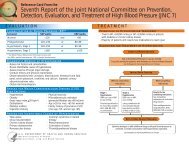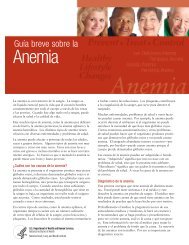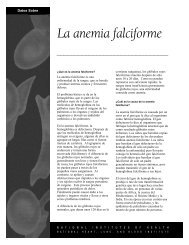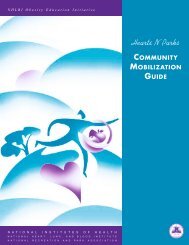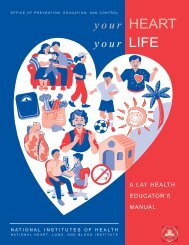WOMEN 'S HEALTH AND MENOPAUSE : - National Heart, Lung ...
WOMEN 'S HEALTH AND MENOPAUSE : - National Heart, Lung ...
WOMEN 'S HEALTH AND MENOPAUSE : - National Heart, Lung ...
You also want an ePaper? Increase the reach of your titles
YUMPU automatically turns print PDFs into web optimized ePapers that Google loves.
patients with strong personal convictions about the<br />
menopause and their need for medication. The<br />
provider must be prepared to discuss a variety of<br />
menopause or age-related topics, and decide what<br />
to recommend for a specific woman—often in less<br />
time than ever before.<br />
The menopause offers<br />
the health care provider<br />
an opportunity to<br />
assess each woman’s<br />
health, her concerns,<br />
and the need for health<br />
promotion and disease<br />
prevention measures.<br />
Recent research findings include:<br />
272<br />
Recommendations should<br />
be specific to each woman<br />
and her background. There<br />
are country-specific and<br />
cultural variations in<br />
menopause symptoms, the<br />
frequency of different<br />
postmenopausal diseases,<br />
clinical practice, health<br />
care resources, and affordable<br />
interventions.<br />
Country- and culture-specific<br />
practice will therefore<br />
vary, and appropriately so.<br />
• Increasing recognition of the need to address<br />
health promotion beyond the perimenopausal<br />
years, and in women with and without<br />
menopausal symptoms.<br />
• The risks and benefits of lifestyle, pharmacological,<br />
and surgical interventions may change as<br />
women age.<br />
• The tailoring of menopausal treatment to the<br />
individual woman should be based on her individual<br />
clinical profile and concerns.<br />
• For the treatment of the climacteric syndrome,<br />
HRT remains the most effective pharmacologic<br />
intervention.<br />
• The long-term benefits and risks of HRT<br />
continue to be assessed.<br />
• HRT for long-term health promotion, as for<br />
osteoporosis, usually requires its continued use.<br />
• New nonhormone therapies offer more options<br />
for prevention of common menopausal conditions,<br />
to be tested fully in clinical trials.<br />
• Preventive drug therapy can start many years<br />
after menopause, particularly with respect to<br />
osteoporosis. This, however, may not be optimal.<br />
• The risk for many disease outcomes can be<br />
reduced even in old age.<br />
Research results are teaching us to be cautious<br />
before assuming that current practice is best. For<br />
example, although HRT remains the gold standard<br />
for the treatment of vasomotor and urogenital<br />
symptoms, as well as for the prevention of bone<br />
loss, recent clinical trial results have failed to show<br />
benefit for other menopausal conditions, such as<br />
incontinence.<br />
Past perceptions about<br />
appropriate indications for<br />
the use of HRT were based<br />
almost entirely on clinical<br />
experience and observational<br />
data. These perceptions<br />
are being questioned<br />
as new knowledge emerges<br />
from clinical trials. Some<br />
examples follow:<br />
The long-term<br />
benefits and<br />
risks of HRT<br />
continue to<br />
be assessed.<br />
Perception: HRT protects against coronary<br />
heart disease.<br />
Evidence: The prospective randomized clinical<br />
trials reported so far have not shown<br />
benefit for reducing coronary events<br />
in secondary prevention.



